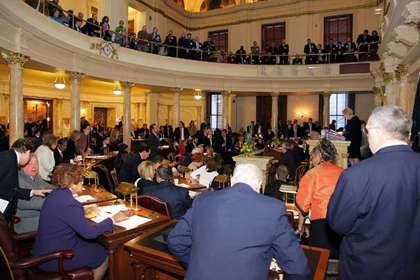
Measure Increases Transparency, Closes Pay-to-Play Loopholes
TRENTON – In an effort to bring more transparency to the electoral process, Senators Jim Beach and Linda R. Greenstein today introduced legislation that would overhaul campaign finance laws by strengthening disclosure requirements, closing loopholes, and standardizing provisions of “pay-to-play” laws statewide.
“The current campaign finance system in New Jersey is full of loopholes and unnecessary complexities, making it difficult for ELEC to enforce and the public to understand,” said Senator Beach, D-Camden. “By requiring full disclosure of all donations, we are not limiting those who wish to donate, but making the process more transparent so that the public can make educated decisions regarding candidates and their contributors. This bill will go a long way to take bureaucracy out of campaigns, and make certain that all candidates, municipalities, and contractors are held accountable to the same set of standards.”
“We need to revisit and revise campaign finance laws that protect taxpayer dollars from fraud and abuse, so that government contractors can no longer circumvent the state’s pay-to-play laws,” said Senator Greenstein, D-Middlesex and Mercer. “Removing arbitrary disclosure requirements and standardizing pay-to-play regulations will help ensure that business entities cannot pay for influence and government contracts.”
The reform bill is modeled after a number of recommendations by the New Jersey Election Law Enforcement Commission (ELEC), and intended to improve campaign finance laws while providing greater disclosure of contributions and expenditures. First, the bill would eliminate an exception from state statute that allows a candidate, political party, or legislative leadership committee to withhold information about donations of $300 or less. In its place, the bill would require the prompt disclosure of all campaign contributions and expenditures to ELEC upon each instance of spending or receiving contributions over a threshold of $3,000. Once the $3,000 threshold is surpassed, a candidate, committee, or organization under this bill would be required to electronically disclose certain information to the ELEC within 48 hours. In addition, the bill would expand reporting requirements to issue advocacy groups, specifically 501(c)(4)s, which are currently exempt from disclosing information about their donors, and 527s, which are only required to make public their donors through the federal government.
In accordance with recommendations included in ELEC’s 2013 Cost Index Report, the bill would also increase the maximum amount that an individual, corporation, union, or candidate committee can contribute during an election cycle. For example, the bill would raise the amount of money that can be contributed by an individual, a corporation or union, or a group to a candidate committee from $2,600 per election to $3,000 per election, and raise the amount of money that can be contributed by a candidate committee, political committee or continuing political committee to a candidate committee from $8,200 per election to $9,200 per election.
Further, the bill would standardize “pay-to-play” provisions by creating uniformity across all levels of government in regards to the awarding of public contracts to businesses. As part of this standardization, the bill would close a major loophole in pay-to-play laws by eliminating a provision of existing law that exempts municipal and county governments from abiding by pay-to-play requirements, provided that the contracts are publicly advertised or competitively bid, which is commonly referred to as a “fair and open process.” The bill would instead make state and local provisions of pay-to-play uniform and apply them to all entities receiving contracts – whether under a publicly bid or no-bid contract. Also, the bill would raise the maximum limit that a business entity can contribute to a campaign preceding award and during the term of a contract from $300 to $1000 for a no-bid contract and from $300 to $3000 for a publicly bid contract, using the lowest-bid process. Currently, businesses are prohibited from entering most state contracts above $17,500 if the firm or its management-level employees have made contributions of more than $300 prior to the awarding of the contract.
Lastly, the legislation would enhance disclosure requirements for companies that do business with government entities. Under the bill, the threshold at which businesses would have to file disclosure reports when granted a public contract would be lowered from a total aggregate of $50,000 in public contracts to $17,500 in the aggregate with one single public entity. This information would be reported to ELEC and collected into a state-operated database.
“New Jersey’s pay-to-play laws ended the practice of trading campaign contributions for lucrative government contracts, and it’s important that we close loopholes so that our citizens can continue to trust in the system,” said Senator Greenstein. “Unfortunately, allowing each municipality to determine their own set of standards for pay-to-play restrictions has resulted in a confusing patchwork of laws. By creating a uniform system for political donations that includes all entities with public contracts no matter how they are bid, we can promote an ethical process that limits undue influence in government.”
“Voters deserve to know who is contributing to campaigns and feel assured that public contracts are being awarded fairly,” said Senator Beach. “We can no longer tolerate an electoral system that allows government contractors to obtain political influence by evading pay-to-play laws and making anonymous contributions to campaigns. This legislation will strike an appropriate balance between the public’s desire for greater accountability in government and the right for individuals and groups to directly engage in the electoral process.”
According to a recent Star-Ledger report, approximately $12 million of the $100 million spent on campaigns in 2011 were exempt from reporting requirements due to the small donation exemption.

